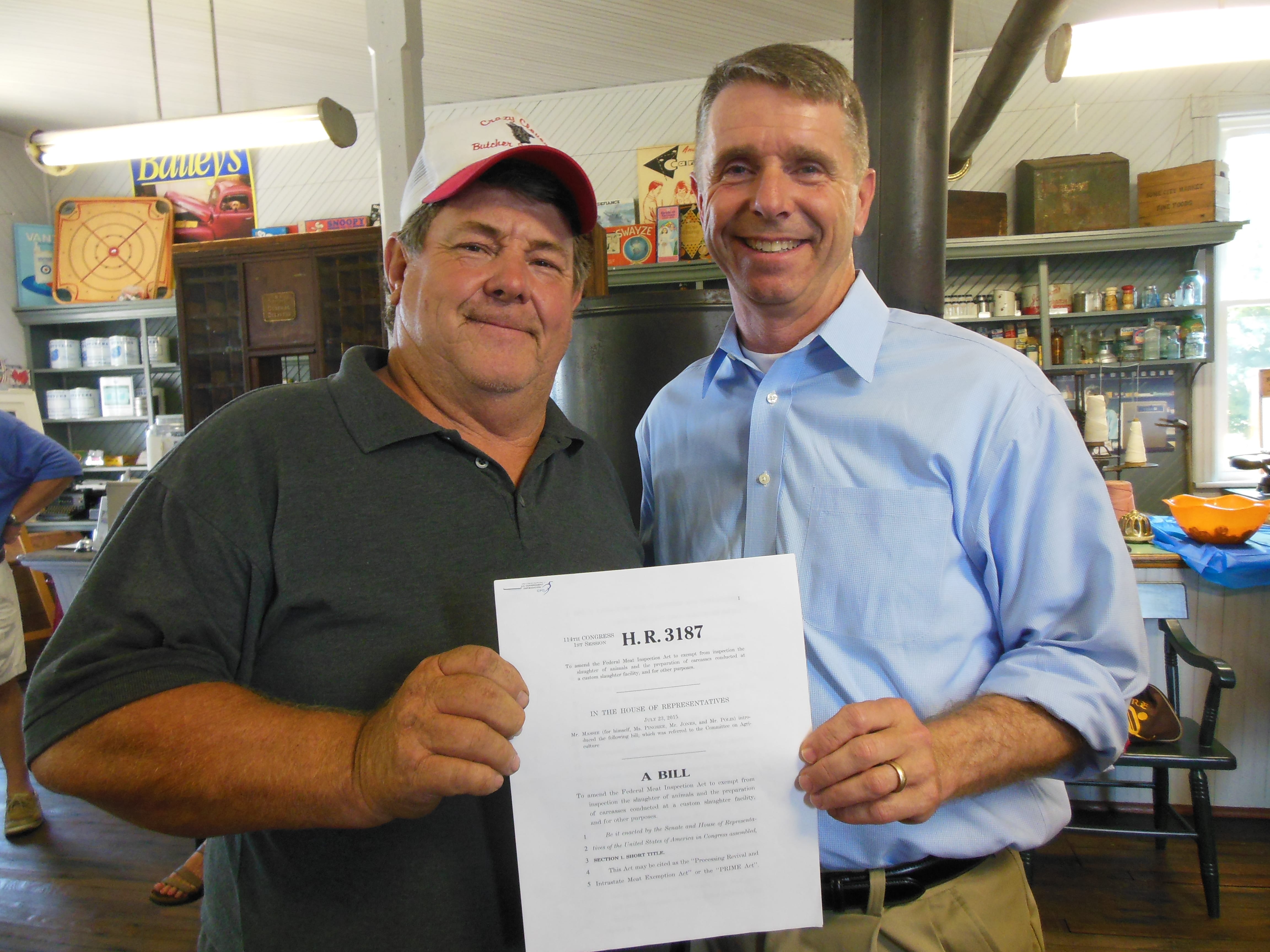Below is a photo of Rep. Rob Wittman with Wayne Burch, owner of Crazy Clover Butcher shop, holding the PRIME Act bill.
 Congressman Rob Wittman has signed onto a bill that will encourage more local production and processing of meat in Virginia. The PRIME Act, H.R. 3187 (Processing Revival and Intrastate Meat Exemption), was introduced by U.S. Representatives Thomas Massie (R-KY) and Chellie Pingree (D-ME). If enacted, it will make it easier for small farms and ranches to serve local consumers. The Act would give individual states the freedom to allow intrastate distribution (within the state) of custom-slaughtered meat including beef, pork, and lamb to consumers, restaurants, hotels, boarding houses, and grocery stores. The bill would not preempt any state laws concerning custom slaughter and processing.
Congressman Rob Wittman has signed onto a bill that will encourage more local production and processing of meat in Virginia. The PRIME Act, H.R. 3187 (Processing Revival and Intrastate Meat Exemption), was introduced by U.S. Representatives Thomas Massie (R-KY) and Chellie Pingree (D-ME). If enacted, it will make it easier for small farms and ranches to serve local consumers. The Act would give individual states the freedom to allow intrastate distribution (within the state) of custom-slaughtered meat including beef, pork, and lamb to consumers, restaurants, hotels, boarding houses, and grocery stores. The bill would not preempt any state laws concerning custom slaughter and processing.
With the ever growing demand for local food and consumers wanting to know how their food is produced, they may not likely know where and how it was processed. If this new legislation is passed, consumers will also be able to know the butcher. The bill will allow local “custom processors” to sell meat by the piece or cut instead of whole animals. Current law requires consumers wanting to do business with a local producer to buy the animal prior to slaughter and pay for the processing. Purchasing what is typically a year’s worth of meat at one time, along with the cost of a chest freezer is cost prohibitive for most consumers; in some instances, the animal can be sold in half- or quarter-portions instead.
In 1967 Congress passed the Wholesome Meat Act. Promoted to make meat safer, the Act has actually has done just the opposite, while also driving out the small processing plants, having the effect of increasing concentration and consolidation in the meat industry. Smaller local and regional processors have been crushed under the constantly increasing costs and federal regulations.
Mike Callicrate owner of Callicrate Cattle Company and an expert on federal meat law explains, “The biggest packers, who welcome any regulation of costs that disadvantages smaller competitors, have continued to increase their market share and market power, further forcing out locally produced meats. This has left consumers with the big packers’ industrially produced meat sourced far from their communities and to a large extent, imported from other countries. Additionally, the only meat available is most often produced in factory farms and processed by unskilled, low paid workers.” He continues, “The result of the flawed past policy favoring big food companies over local food suppliers has resulted in unprecedented recalls of contaminated meats and a growing and risky reliance on imported food. And while our nation’s meat has become less safe, less affordable and lower in quality, the small locally owned processors have been forced to comply with costly and burdensome rules that have nothing to do with improved food safety.”
The simply worded three-page bill, if enacted, will allow for the processing and distribution “directly to household consumers within the state, or restaurants, hotels, boarding houses, grocery stores, or other establishments located in such State that—are involved in the preparation of meals served directly to consumers; or offer meat and meat food products for sale directly to consumers in the State.”
“This bill will not only reacquaint consumers with the local farmer and the local butcher but will also allow the locally owned and operated ‘mom and pop’ restaurants and grocery stores to serve locally raised meats, processed by someone they know and trust, rebuilding our local economies from the soil up,” says Bernadette Barber, a Lancaster county farmer and president of Virginia Food Freedom, a statewide advocacy group. “I hope everyone calls to thank Congressman Wittman for sponsoring this important piece of legislation.”
Wayne Burch owns Crazy Clover Butcher Shop in Middlesex County and has gone through USDA certification emphasizes, “Farmers need to be able to sell directly to consumers. The over burdensome and extremely costly USDA regulations have not made our food safer, but have made it nearly impossible for the small butcher shop to make a profit and remain in business. I thank Rob Wittman for signing onto this legislation. It is a good start in rebuilding our local food economies.”
For inquiries, call 703-208-3276 or email [email protected]Click here to learn what you can do. [PRIME Act white paper print PDF or view at http://bit.ly/PRIME-ACT]
Ask your U.S. Representative to cosponsor HR 3187!
![]()
YOUR FUND AT WORK
 Services provided by FTCLDF go beyond providing legal representation for members in court cases. The Fund is not an insurance company and cannot guarantee representation on all legal matters; possible representation is just one of the benefits of membership.
Services provided by FTCLDF go beyond providing legal representation for members in court cases. The Fund is not an insurance company and cannot guarantee representation on all legal matters; possible representation is just one of the benefits of membership.
Educational and Political Action Services also provide an avenue for FTCLDF to build grassroots activism to create the most favorable regulatory climate possible. In addition to advising on bill language, FTCLDF supports favorable legislation via action alerts, social media outreach, and the online petition service.
You can help FTCLDF by becoming a member or donating today.

 Anyone wanting to make a contribution to support the work of FTCLDF can make a donation online or send a check to:
Anyone wanting to make a contribution to support the work of FTCLDF can make a donation online or send a check to:
FTCLDF
8116 Arlington Blvd, # 263
Falls Church, VA 22042
Prefer to make a tax-deductible donation? Contact us by email at [email protected] or call 703-208-FARM (3276). Thanks for your support.